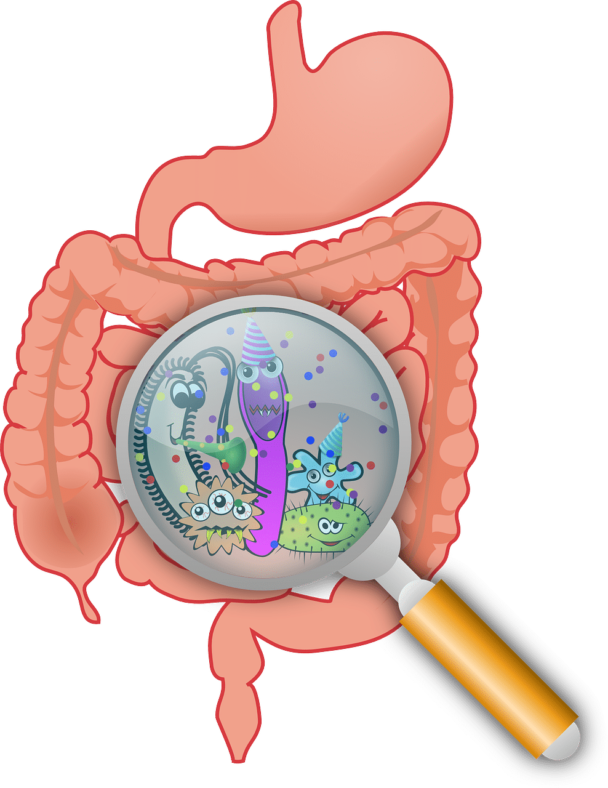Irritable Bowel Syndrome is no big deal! Or is it? For the 1 in 10 people globally who suffer from Irritable Bowel Syndrome, or IBS, it is a huge deal.
IBS does’t discriminate. There are likely many people in your family or social circle that can relate to the challenges of living with IBS. So, you are not alone!
Irritable Bowel Syndrome is one of those “good news, bad news, good news” topics. The good news is that it is not life-threatening. The bad news is that the symptoms can be embarrassing and miserable. The second piece of good news is that most cases can be managed with diet and lifestyle changes alone.
Irritable Bowel Syndrome can negatively affect your ability to work, socialize, sleep, and eat. It can even take its toll on your relationships.
So, we are going to talk about constipation, gut-wrenching pain, and even explosive diarrhea. With all of this comes the knowledge that will give you the power to understand what IBS is and how to treat it and ‘eat’ it away.
What Is Irritable Bowel Syndrome?
IBS belongs to a group of conditions known as functional disorders, more recently renamed to Disorders of Brain-Gut Interaction (DBGI). Fortunately, there are no structural or biological abnormalities with IBS.
Irritable Bowel Syndrome is a common, chronic medical condition where the gastrointestinal tract’s normal function is disrupted. In other words, the speed at which food moves through your intestine can be too fast or too slow.
IBS also involves what is termed ‘sensitivity’ or how the brain interprets signals from intestinal nerves.
This results in symptoms such as abdominal pain, bloating, gas, diarrhea, and constipation. These symptoms can fluctuate and be a mild nuisance one day and be severe the next. This can significantly impair your ability to perform regular daily activities.
IBS can affect anyone, of any sex, at any age, although some groups are more likely to develop it. For example, the condition is more commonly starts in younger adults and affects females more often than men.
This leads experts to believe that there may also be a hormonal component to IBS.
What Causes IBS?
The exact cause of Irritable Bowel Syndrome is not known. We do know that it is a lifetime condition with symptoms that come and go.
There are a variety of elements that may contribute to its cause. These may include:
- Changes in gut microflora. Healthy gut microflora metabolizes nutrients and protects the intestinal wall, but an overgrowth of microflora can cause inflammation resulting in diarrhea
- Intestinal inflammation, as described above
- Severe gastro-infections such as gastroenteritis
- Abnormalities in the intestinal nervous system, which results in how the intestinal wall contracts
- Unusually strong intestinal wall muscle contractions
- Food Intolerances or sensitivities that cause digestive problems
- Stressful early life events such as physical or sexual abuse
How is IBS Diagnosed?
Irritable Bowel Syndrome can often be diagnosed based on your symptoms.
Your doctor will begin by taking a detailed history and do a physical exam to rule out other diseases.
Tell your doctor when your symptoms began and what your past and present symptoms are. Let your doctor know if anyone else in your family suffers from IBS. If you are under a lot of stress, make sure to mention this as well.
You may be asked to adopt a particular diet or remove certain foods from your diet to rule out potential food allergies. Blood chemistry tests may be done to rule out anemia and celiac disease. Stool tests may also be done to rule out infection.
Your doctor may order further tests. If your symptoms are severe or have additional symptoms such as weight loss, anemia, or blood in your stool.
There are a variety of tests to help diagnose Irritable Bowel Syndrome. It is best to discuss which tests are best for you with your doctor.
Treatment Options
There is no known cure for Irritable Bowel Syndrome. But there are strategies to minimize the symptoms and the impact IBS has on your life.
Many people can control their IBS with diet and lifestyle measures. Some people are even able to stop their symptoms and prevent recurrences.
There are also medications for those IBS sufferers who do not respond to diet and lifestyle changes. However, diet and lifestyle measures tend to be most effective in the long-term. Quite often, your doctor will take a ‘staged’ approach to your treatment. You may be asked to start by making one change at a time.
The first thing you may want to do is start a food and symptom diary. Write down every item that you eat and drink and what time you have eaten it. Use this diary to keep track of your daily symptoms and how severe they are. It can be helpful to use a scale of 1-5 for your symptom severity.
For example, if your pain is mild, note the number 1 beside the word ‘pain.’ If the pain is bad enough to stop you dead in your tracks, that is a level 5.
Now, let’s take a look at the various treatment options available.
IBS Nutrition
When it comes to IBS, your treatment plan is very individual. What works for one person may not work for the next. So, make sure you consult with your physician first. Also, keep a food diary.
By eating healthy, balanced diet of three meals and 2-3 snacks a day, you may be able to minimize food triggers. Your diet should be rich in fiber, low in fat, and include a selection of fruits and certain vegetables.
You will be able to eat a wide range of foods. You will be able to dine out.
Foods to Avoid
Some of your favorite foods may trigger IBS, such as:
- caffeine
- dairy products
- chocolate
- alcohol
- fried foods
- spicy foods
- fatty foods
- soda pop
- vegetables that may cause gas such as beans, cabbage, cauliflower and broccoli
- Fruit skins, such as those on apples
- Bran fiber
- Seeds such as sesame, caraway, and sunflower
It is recommended that you eliminate these foods. If beans, cabbage, broccoli, and cauliflower are your favorite vegetables and do not give you IBS symptoms, you may slowly re-introduce them.
Foods to Eat

There are plenty of delicious foods that are not likely to trigger IBS symptoms. You will learn what ones work for you. If any of these foods increase your symptoms, discontinue eating them. You may be able to re-introduce them later.
- All cooked vegetables (except the ones mentioned above)
- Fruit without their skins.
- A peeled apple is fine.
- Increasing your fiber may help. Do this slowly.
- Lots of water. Water intake proves crucial for two reasons. For diarrhea, it will replace lost fluids, and in constipation, it adds moisture to stools.
- Bread, rice, pasta, crackers in any variety without seeds.
- Low-fat dairy products unless you are lactose intolerant. There are many lactose-free options.
- All non-fried meat, including chicken, beef, and fish. Avoid that fat and skin.
- Grilled, broiled, baked, or steamed are good ways to cook your meat. Avoid heavy fats. A cooking spray may be better.
- Snack foods such as pretzels, baked potato chips, fruit, yogurt, frozen yogurt, rice cakes.
- Soluble fiber supplements such as Metamucil may help prevent symptoms if you take it before a meal.
- Just make sure to start with a small amount when you add fiber to your diet.
Eating Habits
Some changes in the way you eat can also help. For instance, instead of sipping through a straw, drink from the glass. This cuts down on the amount of air you swallow.
Artificial sweeteners can trigger IBS symptoms, so limit their use.
Stay on a regular eating schedule. Try to eat your meals and snacks at the same time each day. This may help in regulating your bowel movements.
If you have diarrhea, smaller, more frequent meals will calm the intestines. If constipation is your main symptom, try eating regular-sized meals, and include fiber.
Lifestyle Habits

High-stress jobs, troubles at home, money problems, and significant life changes can increase IBS symptoms. Your intestines react to all kinds of stress.
Of course, it is impossible to eliminate all stress. But you can learn methods of dealing more effectively with your stress. Simple exercises such as yoga and walking in nature are great ways to take the edge off your day. Fifteen or twenty minutes a day can help. If that seems too stressful, try taking 5 minutes out of your day to walk, stretch, or close your eyes.
Go online and find short mindfulness and yoga stretch videos that you can follow. The idea here is to help your body release endorphins that will help your body relax and feel happier.
Eleanor’s Case of IBS
Eleanor is a positive and vivacious woman. Everyone seemed to be drawn to her charismatic personality.
As a sales manager, she traveled across the country to work with her sales representatives. She was always on the go – 70% of her job was out of town. So, I guess you could call her a frequent flyer. Eleanor really thought she loved her career and her life.
Then, during lunch at one of her favorite restaurants, sudden gut-wrenching cramps sent her running to the washroom. Eleanor will tell you that she was glad the restroom was close by.
After that episode, Eleanor was weak and worried. She had to leave the restaurant without having lunch. All she could think was, ‘how am I going to make it back to my hotel room in time to get to the washroom.’
Experiences like that became more frequent. So frequent in fact that Eleanor started making excuses to her employer as to why she was not traveling much.
When Eleanor absolutely had to travel, she made sure she was always near a restroom. She ordered and ate her meals in her hotel room and stopped eating at restaurants. When she wasn’t at work, she avoided any activities that involved leaving home.
Eleanor was terrified that she had cancer. Her doctor asked her a long list of questions about her diet, lifestyle, symptoms, and family history. He sent her for some simple tests.
While waiting for the test results, she kept a detailed food and symptom diary. Eleanor will tell you it was worth the time it took to fill it out. She noticed a correlation between some foods and the appearance of symptoms.
With her doctor’s help, they made a plan that included eliminating certain foods and replacing them with other IBS friendly foods. When her symptoms were severe, she took medication.
Eleanor learned about self-hypnosis and guided meditation for stress reduction. Eleanor also spoke to her employer. They came up with a solid plan to allow her to continue doing her job while decreasing the stress of so much travel and restaurant meals.
Eventually, her symptoms decreased. When symptoms did occur, they were mild. Now, Eleanor only has a flare-up one or two days a year.
Conclusion
Irritable Bowel Syndrome can be a debilitating condition until you make changes to your diet and lifestyle. But it does not have to be a life sentence.
With proper medical, nutritional, and lifestyle guidance, you can regain life’s enjoyment.
If you have IBS, make the changes you now know you need to make. It is YOU that should be a big deal, not your Irritable Bowel Syndrome.

